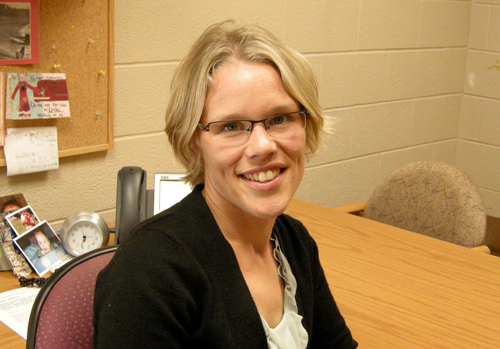
As anyone who has tried to lose weight knows, it’s tough to get rid of those extra pounds. So the record-high rate of obesity among children in North America predicts a lifetime of struggles with weight and ongoing health problems for those kids who have put on too many pounds.
But there is another option, says Prof. Jess Haines, Family Relations and Applied Nutrition (FRAN). Her focus is on prevention instead of weight loss. Before coming to the University of Guelph this summer, she spent three years as an instructor in Harvard Medical School’s Obesity Prevention Program, developing and evaluating programs aimed at helping young children achieve and maintain healthy weights.
While conducting preliminary focus groups and interviews with the parents of children ages two to five years, she learned first that obesity prevention is not a major concern for the average parent. “Yes, they did have some concern about nutrition and activity, but they were definitely less interested in those things compared to child development and discipline,” says Haines.
Factoring in this information, Haines chose to partner with another researcher who offered general parenting information to parents; they enriched that researcher’s program by adding weight-related concepts. After a pilot study with 18 families ─ who described themselves as “very satisfied” with the program ─ Haines will now conduct a broader study with 180 families from the Boston area.
“The pilot study was to see if the program was feasible and acceptable to parents,” she explains. “The larger study will follow the families in the program to see if we can change behaviours and outcomes for the children.”
Participants in the program meet once a week for nine weeks and will be given information on four topics shown in obesity research to be important: ensuring children get adequate sleep, reducing or eliminating sugar-sweetened beverages, increasing activity, and reducing time spent watching television.
These concepts are mixed in with other child-behaviour and discipline topics.
Haines grew up in Kenora, Ont., and earned a master’s degree in community health with a focus on nutrition from the University of Toronto. Her PhD in epidemiology at the University of Minnesota was followed by one year of post-doc research before she went to Harvard.
Her move to U of G, she says, was motivated by two factors. One is personal. “The day my partner and I arrived in Boston, we knew we didn’t want to raise kids there. At that time, we didn’t have any children, so it wasn’t a big deal, but now we have two: four-year-old Oscar and one-year-old Eleanor. Everyone we meet from Guelph says it is a great place to raise a family, and it’s also closer to our extended families.”
From the academic side, Haines is interested in understanding how to better intervene with families to help them avoid weight-related disorders in their children and feels that being part of FRAN will help with this aspect of her work. “The expertise that exists here in child development and family relationships will help me work with parents more effectively,” she says.
A related project, funded by the U.S. Center for Disease Control, is developing ways to reduce the amount of time young children spend watching television and the prevalence of television sets in children’s bedrooms. Both have been linked to childhood obesity.
“We started with focus groups to help us understand the role of television in children’s lives and the reasons parents put a TV set in a child’s bedroom,” says Haines. Some parents told her they wanted a TV in the child’s room so that the child could watch Dora the Explorer while the parents caught up on CSI reruns. Or parents would give each child a TV to reduce the fighting among siblings over what show to watch. “Parents also said they found TV helps when they need to get things done,” says Haines. “The TV keeps the kids occupied and out of the way.”
Using the information she’s gathered from the focus groups, Haines and her fellow researchers are now developing strategies to work with families to help them find ways to reduce TV watching while still accomplishing their goals.
Haines is also becoming involved with the NutriSTEP® screening program created by FRAN professors Janis Randall Simpson and Heather Keller. The NutriSTEP® questionnaire asks parents about a number of nutrition-related behaviours of their preschool children and is currently being used by many health units to determine children’s nutritional risk. “We want to think about interventions that could be developed and tested,” says Haines.
While raising her own two children takes up much of her free time, Haines is looking forward to exploring the Guelph community on her bike and doing some cross-country skiing in the winter.